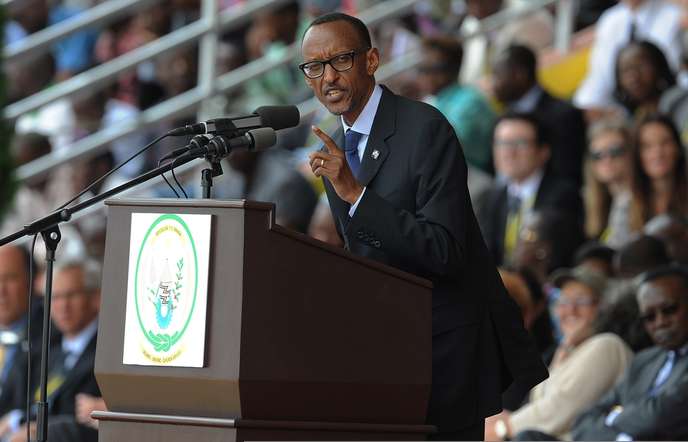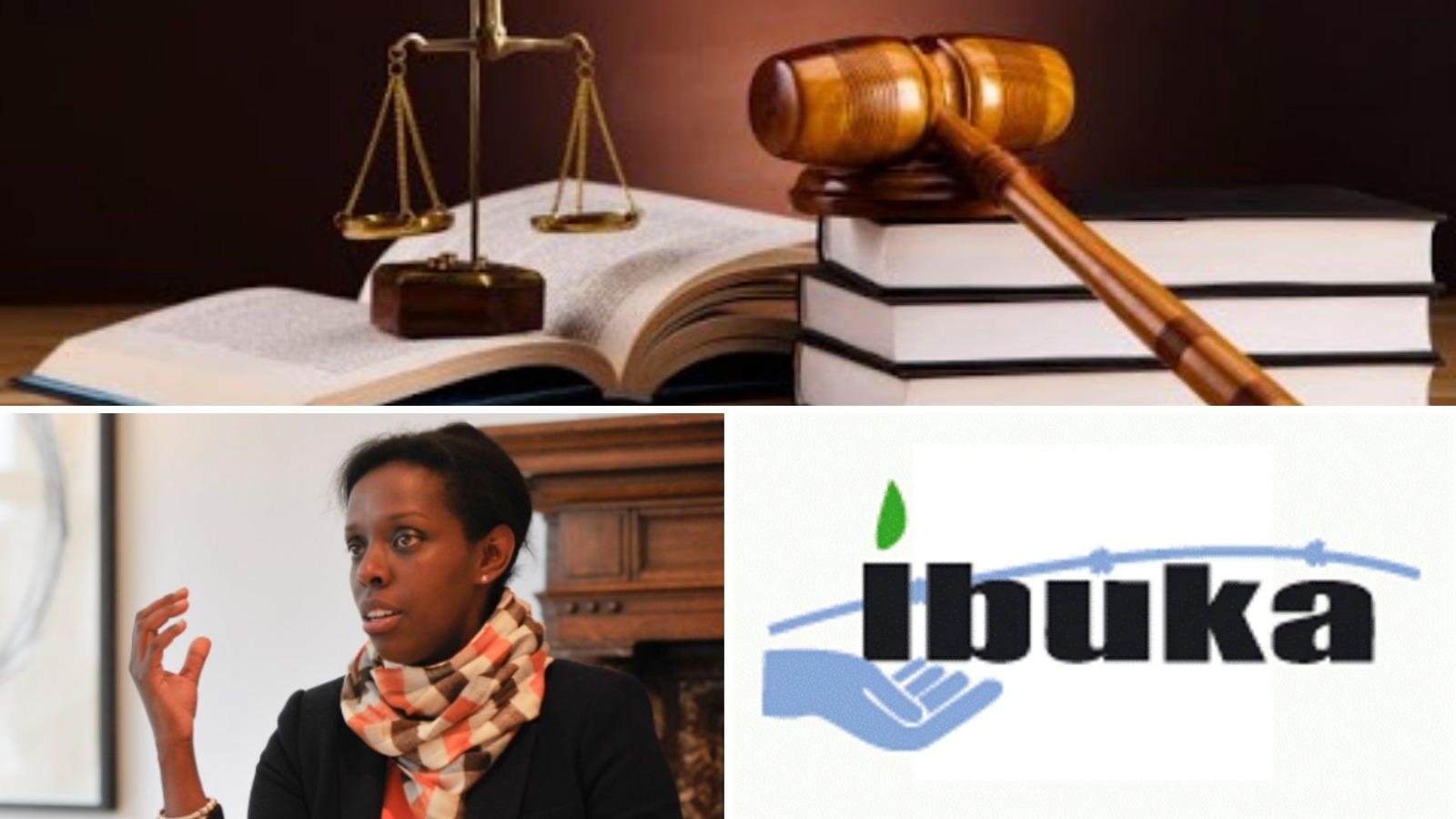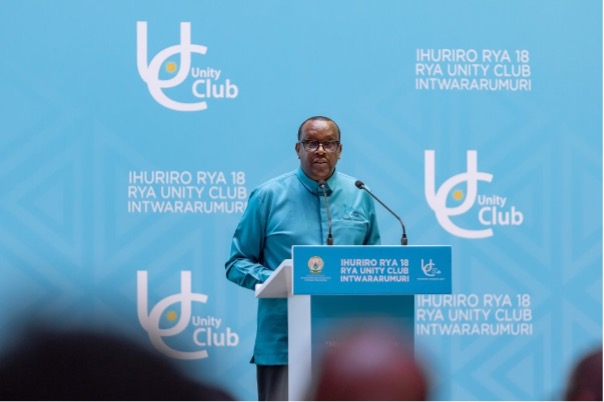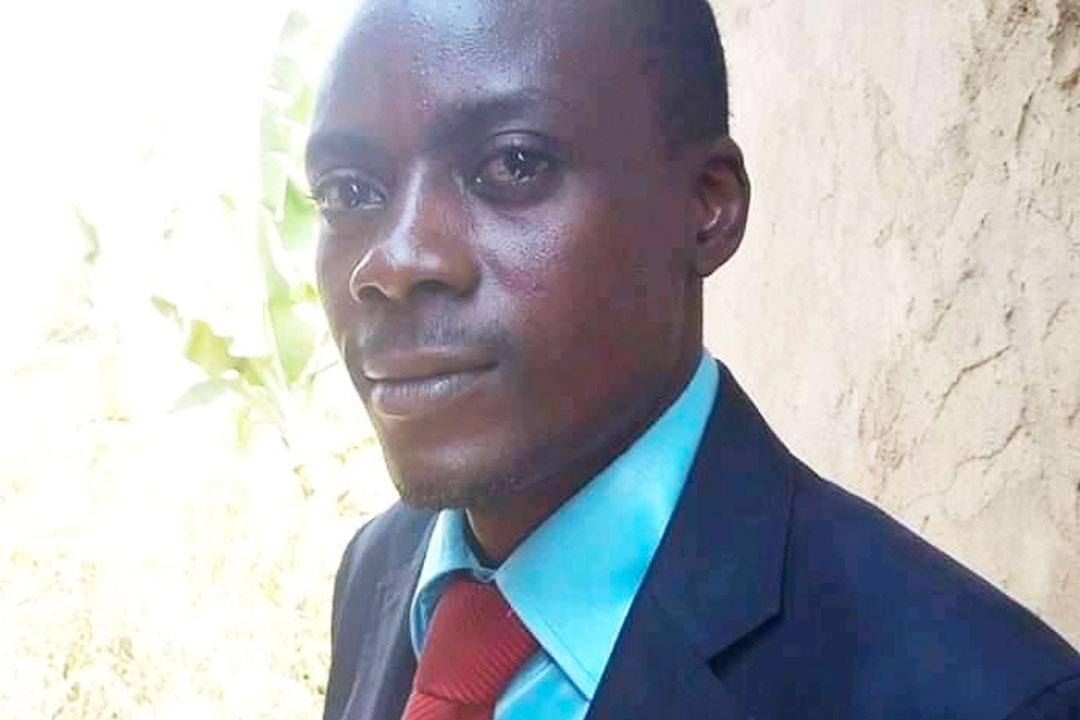On Saturday, March 9, 2019, during his speech at the annual national leadership retreat in Gabiro, Paul Kagame acknowledged the responsibility of his services in the assassination of Seth Sendashonga[1]. Referring to the information in Gérard Prunier’s book, Kagame justified this murder in these terms: “ ” They are elements of truth in what Prunier wrote, we had this information. In fact, Seth Sendashonga died because he crossed a red line. I do not have much more to say, but I will not apologize for that.”[2]. Since then, these remarks have sparked outrage among the Rwandan community. Jean Baptise Nkuliyingoma, Seth Sendashonga’s fellow comrade, told RFI‘s in bitter tone that “while Paul Kagame was making these remarks, a new opponent [Anselme Mutuyimana] was found dead in Rwanda“. For the former Minister of Information, even Paul Kagame’s motive for the murder is fallacious “since the former Minister of the Interior escaped a first assassination attempt in 1996 and many other opponents have since been killed“[3].
Cyrie Sendashonnga, Seth Sendashonga’s widow, also points out the same incoherence “I would like to recall that they first tried to kill him on the 26th February 1996, only 3 months after leaving Rwanda (…) at that time there was no question of this meeting with Ugandan generals, thus it’s clear that this is just a pretext.” According to Mrs. Sendashonga, the meeting mentioned by Paul Kagame, had factually taken place a few days before his husband’s murder “but there was no question whatsoever of an attack on Rwanda, Sendashonga had no army, he was not a soldier, Museveni was concerned that the RPF was becoming increasingly radical and dismissing all the “moderate” Hutus who had collaborated with it, and he was looking for a possibility to put Sendashonga and Kagame back around a table because he was worried about the way things were evolving”. For the widow of the former Minister of the Interior, Paul Kagame’s comments, which “deeply offended her“, “reveal us nothing new about the murder, what is new is that Kagame brags publicly about it“.
Since the Rwandan leader made the remarks, several RPF supporters took on social media to rejoice the death of Seth, some going so far as to assert that Seth’s death was not only “good news” but “very good news”.
This was not the first time that President Paul Kagame made chilling remarks, considering his position as head of state. In this article, Jambonews looks back at General Kagame’s 10 speeches that shocked the Rwandan public which is often paralyzed, refrains from making the slightest public criticism.
- Slaughter refugees “that’s what we did” (April 2010)
The award winning for the horror speech delivered by the Rwandan Head of State is undoubtedly go to the speech Kagame delivered on 13 April 2010 at the investiture ceremony for the new army leaders. The reorganization of the Rwandan army headquarters had placed James Kabarebe as Chief of General Staff in place of General Marcel Gatsinzi and this was the result of Lieutenant General Kayumba Nyamwasa’s fleeing to Uganda where he joined Colonel Patrick Karegeya, former head of Rwanda’s foreign intelligence service. The defection was made official by a statement published on Radio Rwanda on 26 February 2010 by then Rwandan Foreign Minister Louise Mushikiwabo, in which she said that Kayumba Nyamwasa had fled to Uganda[4].
Also for several months a team from the UN High Commissioner for Human Rights had been in the DRC to investigate the extermination of several tens of thousands of Rwandan, Burundian and Congolese Hutus. It is in this context that General Kagame revisited the actions of the Rwandan Patriotic Army between 1994 and 2010: “We have hope, starting at the wars we fought, and to those we told, you fled across the border, with the intent to return to destabilize our country, you will not succeed, on the contrary we will pursue you there and hold you accountable, those who must be repatriated we will repatriate them, those who must be killed we will slaughter them” before adding in English “that’s what we did”.
“Human waste”
During the same speech, he mentioned the RPF dissidents fleeing the country, comparing them to “human waste” “We have fulfilled all the promises we made to the Rwandans, those who forget this because of the privileges of their new lives… they have the right to do what they want, excess has consequences, we let one part do whatever they want and the other part we get it out of our way to have peace (…) those who are fleeing the country, in science when we sit down to eat, once sated body keeps useful nutrients and expels feces. Those who leave are like these human excreta, it means that the body has filtered out.
- “We’ll shoot them in broad daylight” (June 2014)
On June 5, 2014, a few days after the US State Department voiced its concerns about a new wave of arrests and disappearances in Rwanda in which it called on Kigali to respect judicial procedures in accordance with the rule of law, Paul Kagame responded to the criticism and told residents of the Nyabihu district in the northwest of the country:
“These people who are destabilizing the country, they have no place here, when they are among you, when they are about to threaten security, the authorities I told you about, they have an order not to let them return to their places of origin in peace. I warn you, I will get to the point: “He, who escapes your vigilance, will not escape the vigilance of others. What you hear about, we are aware of the international news, on the radio they say people are missing, they are in prison, we don’t believe they are a threat to security, but…But what? Instead, we will intensify our actions, we will not only capture and imprison them, we will shoot them in broad daylight, if people want to know the place of security in our society, we will show it to them”.
On 30 June 2013, in front of several hundred young Rwandans in the framework of the Youth Connect Dialogue, Paul Kagame, in total contrast to the official speech of his government, which denies the existence of ethnic groups; Kagame promoted a program of collective guilt of the Hutus for the genocide committed against the Tutsis and in the same speech Kagame went on to threaten the President of Tanzania who had called a few weeks earlier for a dialogue between Paul Kagame and his opposition.
Regarding the Hutus, Kagame invited people of that ethnic group to stand up and ask forgiveness for the genocide committed “in their name” “Even if you did not kill, stand up to ask forgiveness for those who killed in your name. (…) why are you going to be silent when there is a person who killed in your name?” and the former rebel leader continues “When you are afraid in your actions and words to recognize the crimes done in your name, you do the business of the person who did them, and you benefit from them, it must not happen like that.”
As soon as his speech was finished, several young Hutu knelt down or stood up to ask forgiveness, one of them declaring “what I remember from the speech (of Paul Kagame) is that if I don’t get up to say what our ethnic group has done, I will be a rascal, our ethnic group has done bad things (…) from the bottom of my heart, our ethnic group has done bad things and I apologize for that and whatever the price to pay, I will pay it especially within itorero (the youth of the RPF) (…) forgive us, forgive us, I know that some[Hutus] will not acknowledge it, but understand that we distance ourselves from it and ask for forgiveness. »
In the same speech, the Rwandan leader attacked Jakaya Kikwete, then President of Tanzania, who called for a dialogue between the RPF and his armed and unarmed opposition at the opening of the 21st African Union Summit in Addis Ababa on 26 May 2013. In response, Paul Kagame, referring to the Tanzanian President, replied to those who advise him to negotiate with the FDLR, ” Me, I do not even discuss this topic,(…) I will just wait for you at the right place and I will hit you there is a line, a line that you should never cross (…) because there is a line you should never cross. It is impossible “[5][6].
- On the assassination of Karegeya “the price for treason” (January 2014)
On Sunday, January 12, 2014, during the National Leaders Prayer breakfast with religious leaders, Paul Kagame spoke for the first time about the murder of Patrick Karegeya, his former close ally and head of external intelligence, who had turned into a fierce opponent. His body was found strangled in a hotel room in Johannesburg on 1 January 2014 and Kigali was singled out for being behind the murder.
Commenting on Karegeya murder, the Rwandan leader said “confronted with someone who is not ashamed to destroy what we have taken time to build, for my part, I have no qualms about protecting what we have built (…) Those who accuse us of being responsible have done the same a thousand times to defend their nations” before continuing in the form of a warning to other dissidents in exile “Betrayal has consequences (….) all these guys would have been nothing without Rwanda. It is Rwanda, which they denigrate today, that has made them what they are” And to add, as a warning: “Anyone who betrays our cause or wishes to harm our people will fall a victim. What remains to be seen is how you fall victim”[7].
- On the opponents “idiots, criminals, divisionists” (August 2010)
On August 6, 2010, in the middle of the presidential election campaign, which was taking place in a tense atmosphere following the murder and imprisonment of several opponents in Rwanda and few weeks after the attempted murder of Kayumba Nyamwasa in South Africa in the middle of the World Cup, Paul Kagame states, in a speech in which he constantly mingled his person with that of the RPF his party as well as with the Rwandan State, Kagame stated “those people who are shot abroad and survive, the Rwandan government does not miss his target when it fires. Nor isn’t responsible for the safety of criminals who live abroad. But when these criminals say that they will bring the war to Rwanda, whether it is them or whoever supports them, if they dare, we will hit them, to the point that they will not know what struck them “to the applause of the crowd.
In the months preceding this speech, Paul Kagame had been under heavy international criticism after imprisoning Victoire Ingabire, President of the UDF Inkingi, Bernard Ntaganda, President of the PS Imberakuri and Déo Mushayidi, President of the PDP-Imanzi who appeared to be his main challengers in the presidential election in August 2010. In addition, Franck Habineza, President of the democratic green party had also been unable to run in elections and the body of André Kagwa Rwisereka, his vice-president, had just been found a few weeks earlier, half beheaded.
The Rwandan leader used his campaign speech to react to the international criticism on the repression of the opposition “people without values, people without constructive ideas and tomorrow you hear foreigners coming to say that they are the ones who should be elected as leaders of Rwanda, they [the foreigners] should come to elect them and place them in their own countries, they should make them their leaders. These idiots, these criminals, these divisionists, let them take them, let them lead their countries”.
- The omnipotent president (September 2018)
On the evening of 14 September 2018, the Rwandan Minister of Justice announced in a laconic tweet the release of 2140 prisoners, including Kizito Mihigo and Victoire Ingabire Umuhoza, the icon of the Rwandan opposition. These surprise releases raised hopes among the Rwandan community and observers that the country was embarking on the new path to a political thaw.
However, the optimism was short lived, on September 19, 2018, only 5 days after the releases, Paul Kagame washed away those hopes in a speech to parliament: “The other day, we freed people, among them, were these political stars, of foreign policy and without any basis in the country, this is not the first time we have done it and then you hear them (mimicking with his right hand and mocking and scorning a person who bla bla ), I did not ask for forgiveness, they had to free us because of the pressure; “and to add in a firm voice in an interrogative tone, “Pressure here? “Under the sustained applause of the parliament, before continuing, ““If you carry on like that, you’ll find yourself back over there (in jail)” under a new round of applause and laughter from the deputies.
The scene of a President of the Republic (Chief Executive) going to Parliament (the supreme body of the legislative power) threatening to put a political opponent in prison (the prerogative of the judiciary) if she does not keep a low profile shocked observers. It was a clear showcase and a reminder of how much General Kagame enjoys absolute power in Rwanda.
- “UN should should keep quiet » (September 2010)

On September 17, 2010, one and a half months before the publication of the Mapping Report, Paul Kagame was interviewed by CNN. The draft of the report was circulating in the media, Paul Kagame was questioned about the results of the report, which stated that “The majority of victims were children, women, the elderly and the sick, who posed no threat to the attacking forces”.According to the report, “tens of thousands of Hutu civilians were killed with knives, hammers and burned alive as the Rwandan Patriotic Army and the Alliance of Democratic Forces for the Liberation of Congo advanced (…) the number of attacks against Hutus in Zaire, who were not refugees, confirms that all Hutus were targeted. “
While before the publication of the report the President of Rwanda had threatened to withdraw Rwandan troops who were on a peacekeeping mission in Darfur if the report was published without amendments, he commented on this “indictment of ten years of crimes in the DRC Congo” as follows: “The United Nations has always been wrong on the issue of Rwanda, not only in terms of statements but also in terms of the actions it takes they carried out or did not carry out when they were in Rwanda and the genocide took place (…) The UN has nothing to say about genocide or about Rwanda, they should just keep quiet”.
On 1 October 2010, the final conclusion of the United Nations investigation into these massacres is published in the “Mapping report“. “The apparently systematic and widespread nature of the attacks, which targeted very large numbers of Rwandan Hutu refugees and members of the Hutu civilian population, resulting in their death, reveal a number of damning elements that, if they were proven before a competent court, could be classified as crimes of genocide.”
- “This will be my last term.”
In the same interview with CNN, when asked if his second term was his last, Paul Kagame answered in a convinced tone: “This is my last term! I have said it a hundred times, people don’t want to believe me, because they say we have heard others say that, then they change their minds, this is something African …especially in the case of Rwanda, in my personal case, it will be my pleasure and my duty to ensure that we all respect the constitution as it is today, the constitution provides term limits, which will allow others to become presidents and allow me to step-down”.
Few years later, on 17 November 2015, Rwandan senators adopted a constitutional amendment allowing Paul Kagame to remain in power potentially until 2034, for three additional terms. The deputy spokesman for American diplomacy at the time reacted to this reform: “The United States notes with great concern the vote of the Rwandan Senate’s today. We expect President Kagame will to follow through his previous commitments to forester a new generation of leaders in Rwanda, and to step down at the end of his current term in 2017. If he decides to remain, it could have consequences for future relations.[8]
On August 4, 2017, Paul Kagame, again candidate for his own succession, and having dismissed his main challengers, he was re-elected with a Stalinist score of 98.79% in the elections that Human Rights[9] Watch had described as “politically locked”.
- That Diane Rwigara continues to warm up in prison (December 2017)
On 22 September 2017, Diane Rwigara, after having been prevented to participate to the presidential elections, she was arrested along with her sister Anne Rwigara and her mother Adeline Rwigara for “inciting insurrection and forgery “. Jambonews re-traced the chronology of the Rwigara case in an article published on 6 December 2018. On 23 October 2017 the Rwandan authorities are had to release Rwigara Anne because she has US citizenship and US diplomacy was very active behind the scenes. It that context, the arrest of the Rwigara family criticized by the international community, that during the RPF party congress on 14 December 2017, President Paul Kagame again attacked Diane Rwigara and the RPF dissidents
“Those of the RPF who do not respect the principles of the RPF and who will defend their own interests instead of defending the interests of Rwandans or the interests of the RPF, in those case they show their weakness to the international community, the one who couldn’t fight you from abroad will use them because they are inside the country”…” a young girl who wanted to become president supposedly, because she wants to bring peace, now she has been imprisoned, they[the international community] promised her that this is what they will say to damage the image of Rwanda. But they found themselves in front of the RPF, which does not fear these types of accusations. When they come questioning us, we tell them what they deserve to hear, we show them problems they have created, problems in their countries. Then they pretended not to know her anymore… They[RPF dissidents] left to carry the boxes (referring to the unqualified jobs exercised by many Rwandan intellectuals and political refugees abroad) or she[Diane Rwigara] went to warm herself up in prison“.
- “The right to kill Habyarimana (December 2006)
On 1 October 1990, Rwanda entered the war following an attack by the RPF-Inkotanyi from Uganda. For four years, the territory of Rwanda was to be the scene of various atrocities committed by the various belligerents and consisting of political assassinations, war crimes, crimes against humanity and even crimes of genocide committed against certain communities in Rwanda. These violences pushed nearly one million Rwandans in the northern territories to flee their homes and ended up mainly in camp for internally displaced persons of Nyacyonga.
On 4 August 1993, there was a beacon of hope of a peaceful way out of the crisis with the signing in Arusha of peace agreements aimed at establishing democratic and inclusive institutions in Rwanda in order to achieve lasting peace in the country.
On 6 April 1994, President Habyarimana’s plane was shot down on his way back from Arusha as part of the signing of an additional protocol to the agreements. This attack buried hopes for a peaceful solution to the Rwandan crisis and it is often considered to be the trigger for the genocide that begun within hours after the attack.
For 25 years, the controversy over the perpetrators of this attack has fueled rumors.
On 6 December 2006, few weeks after a French judge had accused President Kagame of being behind the attack that spackled the genocide, Kagame was interviewed on the BBC’s Hard Talk show. In his own style of explaining and justifying a crime he is accused of but without going so far as to claim it clearly, Kagame justified such an attack as follow: “I was a refugee outside Rwanda for 30 years, I had the right to fight for my rights (…) if I had died in the same process, would this judge be asking who killed me? (…) I was not responsible for Habyarimana’s safety and I don’t care about his death, (…) I had the right to fight this government that has made me a refugee all these years, I had the right to fight it and this judge wants to question me? »
The authors of this article are aware that other speeches by the Rwandan Head of State especially during the period 1994-2000, which would have deserved to be in this top 10. However, some are difficult to recover, the choice of the redaction was to mention the speeches with the audio, video or other recordings are publically available only.
Ruhumuza Mbonyumutwa and Constance Mutimukeye
Jambonews.net
[1] Le président Kagame reconnaît un assassinat politique, La libre Afrique du 15 mars 2019.
[2] Rwanda: polémique après les propos de Kagame sur l’assassinat d’un opposant, RFI du 14 mars 2019
[3] Ibid.
[4] http://www.arib.info/index.php?option=com_content&task=view&id=1620
[5] Le Rwanda et la Tanzanie à couteaux tirés, jeune Afrique du 27 août 2013.
[6] http://www.afroamerica.net/AfricaGL/2013/07/03/i-will-just-wait-for-you-at-the-right-place-and-i-will-hit-you-rwandan-general-paul-kagame-threatens-tanzanian-jakaya-kikwete//index.html
[7] Assassinat de Patrick Karegeya: pour Kagame, «la trahison a des conséquences», RFI du 13 janvier 2014.
[8] https://www.20minutes.fr/monde/1733247-20151118-rwanda-reforme-constitution-permettant-troisieme-mandat-kagame-adoptee
[9] https://www.hrw.org/fr/news/2017/08/18/rwanda-des-elections-politiquement-verrouillees




